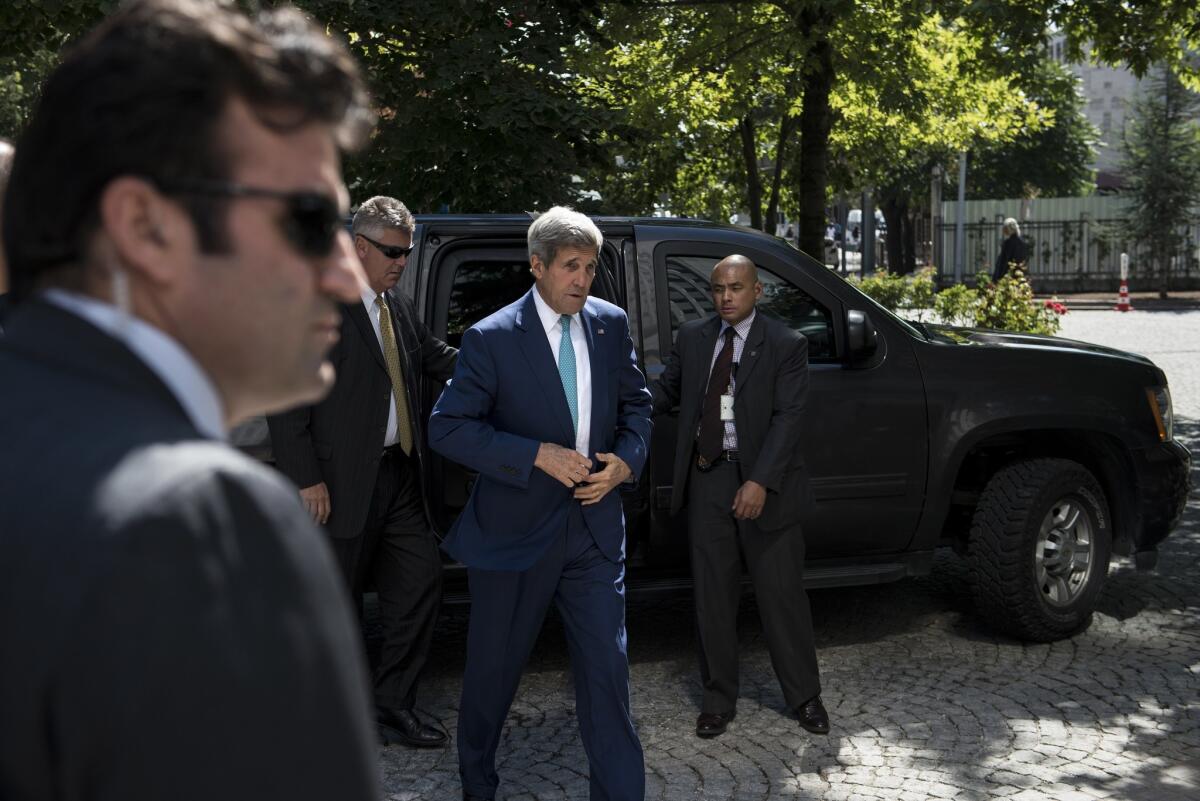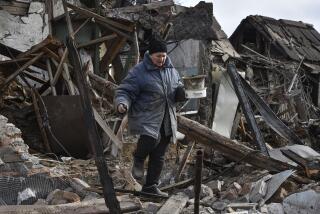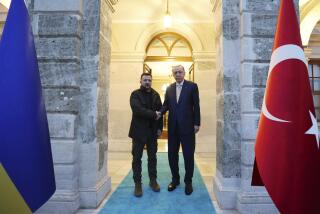No breakthrough as Kerry urges reluctant Turkey to help fight militants

Secretary of State John F. Kerry visited Turkey on Friday, seeking to persuade a reluctant leadership in Ankara to participate in a U.S.-led military campaign against Islamic militants in Iraq and Syria.
But there appeared to be no breakthrough in convincing Turkish officials to join the military front against the Islamic State, the Al Qaeda breakaway group that has seized territory in Iraq and Syria, two of Turkey’s neighbors.
“Turkey and the United States will stand together against any challenges in the region, including all terrorism,” Kerry declared after meeting with top officials, including President Recep Tayyip Erdogan.
While Turkey is a NATO ally, its leaders are hesitant to partake in military action as part of what U.S. officials say will be a coalition of more than 40 countries arrayed against the Islamic State.
Asked if the Turks had given permission for U.S. fighter jets to use the Incirlik Air Base in southern Turkey, Kerry replied that it was too early yet to detail any country’s role in what he labeled the Global Coalition to Counter ISIL, after a common acronym for the Islamic State.
“It is entirely premature and frankly inappropriate at this point in time to start laying out ... what individual nations are going to do,” Kerry told reporters in Ankara. “A lot of details are being worked out.”
But it seemed unlikely that Turkey would agree to join in military action, though Ankara is reported to be open to providing humanitarian and logistical support in the campaign against the Islamic State.
The Turkish government fears potential blowback and retaliation if it joins in military actions against the Islamic State. Specifically, Turkish officials are worried about the fate of more than 40 Turkish citizens seized by militants in June when the Islamic State overran the northern Iraqi city of Mosul. The captive Turks include staff of the Turkish consul general’s office in Mosul and their family members.
“Our hands are tied because of the hostages,” a Turkish official told the Agence France-Presse news agency on the eve of Kerry’s visit. Turkey “will not be involved in any armed operation but will entirely concentrate on humanitarian operations,” the official told AFP.
In the past, Islamic militants in Syria have vowed to strike in Turkish territory if the Turks took military action against them in Syria. Still, Turkey has fired shells into Syria in response to cross-border fire from both government and rebel positions in Syria.
President Obama vowed this week to “destroy” the Islamic State, which has beheaded two captive U.S. journalists in retaliation to a White House-ordered bombing campaign against its positions in Iraq.
Turkey has become deeply entangled in the Syrian civil war, allowing its more than 500-mile border with Syria to be used as a transit point, logistics base and medical treatment hub for rebels fighting to oust Syrian President Bashar Assad. The flow of supplies and recruits into Syria from Turkey has been crucial for Syrian rebels. Turkey also hosts more than 1 million refugees who have fled the fighting in Syria.
While in Ankara, Kerry announced that the United States was providing an additional $500 million in humanitarian aid for people affected by the war in Syria, including almost $50 million for Turkey. Since the Syrian conflict erupted in 2011, U.S. officials say, Washington has provided more than $2.9 billion in assistance, making the United States the largest single humanitarian donor in the Syrian crisis.
Turkey’s Islamist-led government has repeatedly called for Assad to step down and says it has assisted moderate rebels. But Ankara has denied allegations that it has facilitated the movement of thousands of Syria-bound militants from Europe, or looked the other way as the extremists have entered Syria through Turkey.
Turkish officials say they have tightened border controls as officials in Washington and elsewhere have expressed concern about the flow of militants.
Turkey could be a logical staging ground and participant in the military campaign. It shares borders with both Syria and Iraq; part of Turkey’s southern frontier abuts Islamic State positions in Syria. Turkey also possesses one of the region’s most formidable militaries and a modern air force equipped with U.S.-made fighter jets.
It was not clear if U.S. officials were pressing Turkish authorities for access to air bases in Turkey and expanded overflight permission for sorties against militants.
On Thursday, Turkey refused to join 10 Arab nations that signed a communique in Jeddah, Saudi Arabia, vowing to assist the U.S.-led campaign against the Islamic State. Kerry had flown to Saudi Arabia to drum up support for the U.S. plan.
Ankara was the second stop on his tour to mobilize allies against the Islamic State following Obama’s address on Wednesday outlining a new U.S. military blueprint against the militants. What exactly most of the Arab nations and other coalition partners will do as part of the military campaign remained unclear.
In an interview with the BBC, Kerry said he understood that Turkish authorities are grappling with “sensitive issues” in weighing whether to contribute to military action against militants in neighboring Syria and Iraq.
“We respect those issues, and we’re going to work with them [the Turks] very closely,” Kerry told the BBC.
Follow @mcdneville on Twitter for news from the Middle East
More to Read
Start your day right
Sign up for Essential California for news, features and recommendations from the L.A. Times and beyond in your inbox six days a week.
You may occasionally receive promotional content from the Los Angeles Times.





